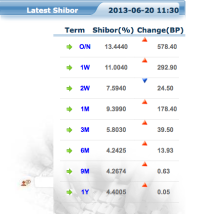China's Money Rates Fall After The Chinese Central Bank Is Said To Step In
Yesterday we pointed out a sharp rise in money market rates in China.
Today we've seen a decline in SHIBOR or the Shanghai Interbank Offered Rate — the benchmark interest rate used in lending activities between banks.
The Shibor fix for June 21 shows that the overnight rate is down 495.20 basis points to 8.4920%. This compares with 578.40 basis point increase yesterday to 13.44%.
Bloomberg reported earlier that money market rates had declined after the People's Bank of China injected 50 billion yuan through short-term liquidity operations. The one day repo fell 384 basis points to 7.90%, the biggest drop since 2007.
Here's a quick look at today's quote, and yesterdays.

SHIBOR


SHIBOR
But there isn't much reason to celebrate.
Just because PBOC made this problem "go away" for the moment, doesn't mean the real problem is solved.
— Patrick Chovanec (@prchovanec) June 21, 2013
VERY interesting that overnight and 7-day SHIBOR fell, but 14-day and 1-month rates rose http://t.co/XofQA7OGNj serious stresses remain
— Patrick Chovanec (@prchovanec) June 21, 2013
The liquidity squeeze in China first began ahead of the Dragon Boat festival earlier this month. Spikes in interbank rates are common right before holidays.
The rise in money market rates was also attributed to a decline in speculative activities after tightened FX curbs, the crackdown on illegal bond trading, banks' filings to the PBOC and the China Banking Regulatory Commission (CBRC), to meet their loan-to-deposit ratio.
FT Alphaville's Izabella Kaminska (@izakamisnka) has a great piece that argues that the rise in money market rates could be attributed to the unwind of the Chinese over-invoicing carry trade.
The argument so far has been that the Chinese central bank is "punishing some small banks which had previously taken advantage of the stable interbank rates to finance their purchase of higher-yield bonds," according to Ting Lu. Earlier this week China withdrew 4 billion yuan in liquidity through two bill issuances.
But Dong Tao at Credit Suisse pointed said "this wrestling, in our view, has heightened systemic risk in the financial system, creating policy uncertainty and has further induced market volatility."
He also argued that these rates haven't affected the "real economy" yet and that state owned enterprises (SOEs) are still flush with cash, though the small and medium enterprises are "struggling with liquidity." Tao thinks the SHIBOR has peaked but that rates will remain elevated.
More to come...
More From Business Insider

